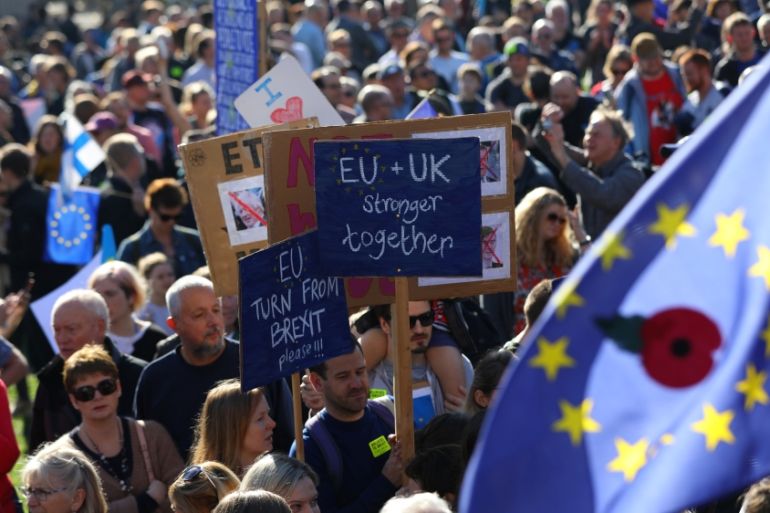Anti-Brexit protesters gather to demand second referendum
Britons march in London demanding ‘people’s vote’ to give public final say on UK’s political future as EU talks stall.

London, England – Anti-Brexit protesters are marching in London to call for a second referendum on Britain’s departure from the bloc, less than six months before the divorce from the European Union becomes a reality.
Demonstrators from across the country on Saturday are demanding a “people’s vote” to give the public the final say on the UK’s political future.
Keep reading
list of 4 itemsNorthern Ireland agreement could end deadlock, restore government
Forced to become British: How Brexit created a new European diaspora
Number of Britons regretting Brexit hits new record high: Survey
The event intends to amplify the voices of British voters increasingly frustrated about the perilous state of negotiations between the UK and EU, and is organised by the People’s Vote coalition of anti-Brexit campaign groups and the Independent newspaper.
“This week’s fresh chaos and confusion over Brexit negotiations has exposed how even the best deal now available will be a bad one for Britain,” said Andrew Adonis, People’s Vote campaigner and Labour Party politician.
“Voters will neither forgive nor forget if MPs allow this miserable Brexit to proceed without people being given the final say.”
Senior politicians from all major parties will speak at the rally, including London mayor, Labour’s Sadiq Khan and Liberal Democrats’ leader Vince Cable, as well as celebrities such as former England footballer Gary Lineker and TV chef Delia Smith.
“I’m opposed to the UK leaving the EU and I’m opposed to ending freedom of movement,” said Steve Thomas, who had travelled to London for the rally. “I’ve always planned to retire to the continent. Looks like that’s not going to happen for me now.”
“I feel that the original referendum was a false premise. It wasn’t clearly articulated what was on offer,” said Sarah Williams, from London. “[A second referendum] gives people an opportunity to vote for something meaningful … That wasn’t done the first time around. I think it’s worth fighting for.”
“I don’t think the current route they’re heading on as far as Brexit’s concerned is a very promising one and I think anything we can do to change it is a positive thing,” said student Ben Carpenter, from Norfolk. “It’s definitely important for young people. It’s our future.”
![Anti-Brexit campaigners say voters were misled [Simon Dawson/Reuters]](/wp-content/uploads/2018/10/c559a48be0474cd7950909304a1be8b5_18.jpeg)
The demonstration comes as talks between the UK government and EU have reached an impasse. This week, EU leaders dropped plans for a special summit in November, citing a lack of progress in negotiations.
Figures on both sides have now suggested that a worst-case “no deal” scenario is now the most likely.
The EU’s chief Brexit negotiator Michel Barnier said a withdrawal deal was 90 percent agreed, but a solution to the thorny issue of Ireland’s border remains no closer than when talks began.
“I’m convinced a deal is necessary, I’m still not sure we’ll get one,” he told France Inter Radio on Friday.
Without a deal to cement the UK’s planned 21-month transition period, it would crash out of the EU and its customs union on March 29, 2019, with a government analysis predicting a 10 percent drop in GDP in a no-deal scenario.
Ports and airports would be thrown into chaos, potentially destabilising the country’s food supply.
Anti-Brexit campaigners say voters were misled when they voted by a 52-48 margin to leave the EU in June 2016, and that the Leave campaign’s promises to increase funding for the country’s health service and strike more favourable trade deals with non-EU countries were dishonest.
The Irish question
Prime Minister Theresa May has said there will not be a second referendum and that the 2016 result represents the democratic will of the people.
However, May’s Brexit proposals have foundered on the Irish question, unable to satisfy the irreconcilable demands made by the EU and hardliners within her own government.
Ireland, backed by the EU, will not accept any deal that will result in a change to its border with Northern Ireland, which currently allows for the free movement of people and goods without customs checks. But May has committed to leaving the EU’s single market and customs union, which would require checks along the UK’s only land border.
Proposals to keep the UK, or just Northern Ireland, within the customs union have been rejected outright by hard-liners within May’s Conservative Party and the Northern Irish Democratic Unionist Party, on which her government’s slim majority relies.
Supporters of a second referendum hope that this bind might force May to turn to the people.
“A final-say referendum or people’s vote is becoming likelier by the week,” says deputy director of the anti-Brexit think-tank British Influence, Jonathan Lis, who believes the UK parliament will not permit any deal proposed by May or a no-deal scenario.
“A new referendum could represent a compromise solution and a way out.”
Even if a second referendum were secured, it remains unclear if any set of options on the ballot could appease all sides.
Constitutional experts have also questioned whether enough time remains to hold a second referendum unless the EU agrees to delay the UK’s exit to accommodate it.